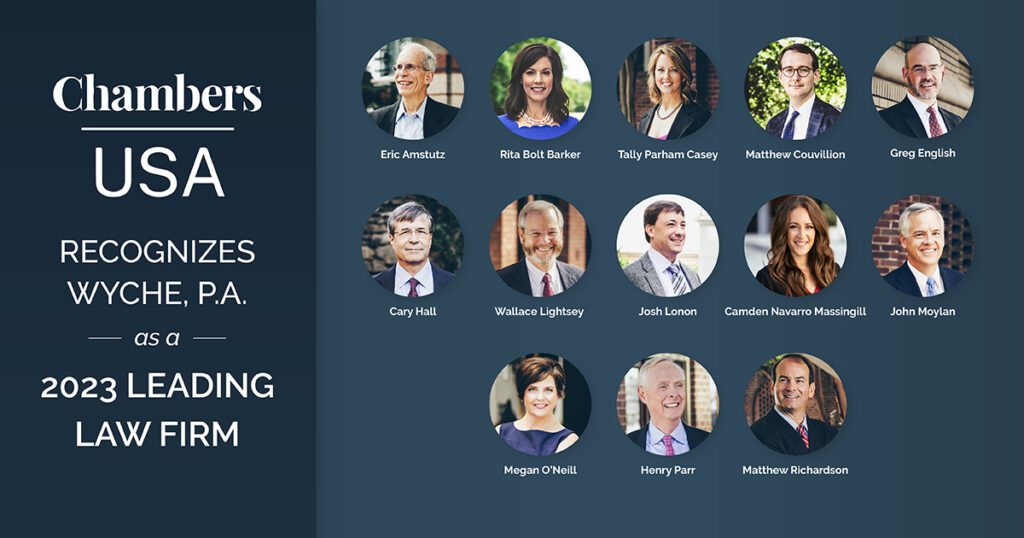Interview with Ted Gentry
As heard on “The South Carolina Business Review” with Mike Switzer
Broadcast Thursday, June 28, 2012
Read the transcript below:
As summer approaches, industrious students are eager to gain workplace experience and make connections with potential employers, and businesses will always welcome some low-cost help. As a result of these pressures, the American workplace has seen an increasing emphasis on unpaid internships.
Here to talk about this phenomenon is Ted Gentry. Ted is a civil litigator and employment lawyer with Wyche, P.A. in Greenville. Ted has been at Wyche over 20 years, handling litigation in federal and state courts, and advising a variety of employers and individuals on employment law.
Ted, it seems as though an unpaid internship could be a win-win proposition. Why is it a matter of concern?
As you observed a moment ago, Mike, it’s easy – especially in this job market – to imagine students who would willingly give up a summer’s worth of pay in exchange for an inside track toward a permanent position after graduation. But there’s a significant obstacle to the creation of that type of arrangement. The Fair Labor Standards Act – that’s the legislation that imposes the minimum wage and requires the payment of overtime – prohibits an employment relationship in which the employee does not receive at least the minimum wage.
But are interns really “employees”? Isn’t there an exception to the Act for internships?
Mike, you’ve asked the right question. The short answer, of course, is that an employer can’t avoid the requirements of the act merely by calling someone an “intern” rather than an “employee.” If it were that simple, we’d probably see a lot more interns.
Now the law does draw a distinction between an employee and an intern, but the definition of intern is so incredibly narrow that – to my mind at least – it almost never applies to what most employers might think of as an internship.
The United States Department of Labor has created a six-part test for determining whether someone is an intern – and therefore can be in your place of business without pay. (Notice that I didn’t say they can “work for you” without pay – that’s one part of the test.) All six parts must be met; if even one is not met, the person is an employee and must be paid. Since this is early morning radio, I won’t go through all six, but I think even three are sufficient to give a flavor of how strictly the Labor Department interprets this exception.
- The internship must be similar to training that would be given in an educational environment; to put it another way, the internship should normally be part of a training program or progress toward a degree;
- Second – and this is related – the internship experience must be for the benefit of the intern – not the employer;
- Indeed – and this is the deal killer for most unpaid internships – the employer that provides the training must derive no immediate advantage from the activities of the intern; and on occasion its operations may actually be impeded.
Wow. That really does seem to make it difficult to have unpaid interns. Do most employers understand this?
Recent events suggest that even relatively sophisticated employers may not. In the past few months, there have been several lawsuits filed against high-profile defendants, alleging violation of the wage and hour laws in internship programs. One was filed against the production company that produced the movie the Black Swan, another against the company that produces the Charlie Rose Show, and another against Harper’s Bazaar magazine, all on behalf of interns who claim they were forced to work without being paid. I think it’s important to emphasize that I don’t know the facts of any of those cases, or whether there was in fact a violation. But the fact that unpaid internships have resulted in these types of lawsuits suggests that there are lawyers out there who believe that these types of violations may be relatively common.
It sounds as though an employer considering having an unpaid intern should consult with a lawyer.
Mike, unfortunately I have to agree with you. The Fair Labor Standards Act is not simple, and it’s not an area of the law where you can rely on your common sense as a good guide. Just to give you an idea of the additional complexities that might come up, there is a separate exception that allows individuals – under certain circumstances and for humanitarian purposes – to volunteer their services without pay to non-profit organizations. And as I noted a moment ago, I described only three of the six prongs of the Department of Labor’s test. So, yes, if you believe it may be appropriate to create an unpaid relationship with someone coming into your place of business, I’d run that by a lawyer who’s familiar with these rules.
But I would offer one rule of thumb: if as an employer you find yourself thinking “It would be really good to get some help from an unpaid intern this summer,” that could be a red flag. The program is supposed to benefit the intern, not the employer.






